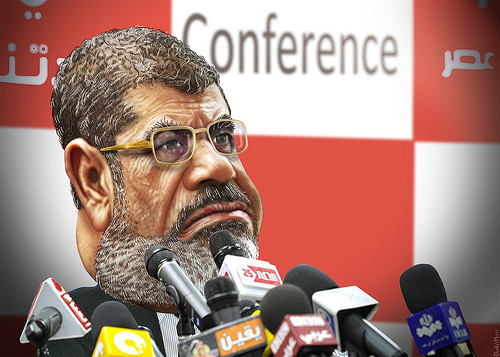Egypt’s Writers Call for the Impeachment of Morsi
by Hamdy El-Gazzar and translated by Nour Abdelghani / July 2, 2013 / No comments
“Writers are the conscience of the nation…they must express the nation’s dreams and aspirations.”

The Egyptian Writers Union has called for an early election to oust President Mohamed Morsi, claiming that the Muslim Brotherhood's idea of culture clashes with the people's diversity. Photo: Flickr via DonkeyHotey
On the morning of June 21, after an impromptu meeting at the Egyptian Writers Union (EWU)—which is only a few blocks away from the Egyptian Ministry of Culture—the members of the EWU voted on a measure to withdraw the union’s confidence from president Morsi and call for early presidential elections and the creation of a nationally unified government. The EWU also intended to demand the drafting of a new constitution that reflects the national consensus.

- “From Egypt” attempts to draw a cultural map of Egypt and the Arab world by profiling the artistic, literary, and political issues that affect the region via on-the-ground coverage of current events, publications, and the fight for freedom of expression.

- Hamdy El-Gazzar is an Egyptian writer and one of the 39 young Arab writers included in the Beirut 39 Project. His first novel, Sihr Aswad (Dar Merit, 2005) won the prestigious Sawaris Award, and was subsequently translated by Humphrey Davies (Black Magic, AUC Press, 2007). His second novel, Ladhdhat Sirriyya (Secret Pleasures) was published by Dar al-Dar in 2008. He is currently working on a third novel.
At the meeting, one hundred and eleven out of the union’s 2000 members confirmed that the opposition to the current leader’s politics is a cultural opposition. They also stated that the battle in Egypt today is a conflict between the Muslim Brotherhood’s idea of culture, and the Egyptian people’s diversity of faith, beliefs, cultures, and directions.
Author Youssef al-Qaed described the EWU’s decisions as an honor for all Egyptian intellectuals and reaffirmed the fact that their stance is an effort to defend the honor of all Egyptian writers and intellectuals. The decisions “were the first of their kind taken in the history of the Union,” al-Qaed said, adding that the decisions did not only withdraw confidence from Morsi, but also provided a road map for the period after him.
He went on to explain that the late Muslim Brotherhood intellectual Sayyid Qutb had changed his ideas after visiting the United States in the 1950s. Before leaving for the States, Qutb had been a promising literary critic and a poet, he said, but after his return he wrote Maalem al-Tariq (Milestones), which the late president Gamal Abdel-Nasser described as “a book with thoughts that stand behind a large organized group.”
“Writers are the conscience of the nation, and they must express the nation’s dreams and aspirations,” the head of the EWU, Mohammed Salmawy, told the Weekly, adding that Muslim Brotherhood elements had attempted to foil the Union’s resolutions, but had not succeeded.
History has proven that the stance of the Arab intellect is at the forefront of society, more than any political stance, including Morsi’s. Intellect is considered the voice of our souls. Salmawy is right; writers are the conscience of the nation, and they must express the nation’s dreams and aspirations. This tradition makes the intellect’s impact stronger than any political act. However, the intellect’s impact cannot be made without an understanding of culture—which goes beyond the parameters of literary writing and reaches the meaning of culture from a broader, social point of view. The EWU believes in writers and artists, their guiding vision, critical thinking, and their ability to create alternatives for society.
Currently, the EWU takes a clear stand against the cultural, political, and social atrophy that Egypt is going through. They believe that the current regime’s devastating impact can be measured on two levels: The public and, especially, the political. This system also threatens the security and safety of Egypt on two levels: The national and the international. The current leadership has proven its failure of vision and practice in producing social and political strategies for both the short- and long-term. This weakness has so disrupted Egypt’s national affairs that it has also damaged Egypt’s international image.
At the meeting on June 21, the EWU declared four essential points:
1. Impeach Dr. Mohamed Morsi from his position and hold an early presidential election.
2. Create a temporary ruling government that includes representatives of different political and ideological views.
3. Hold those in power accountable for every the deaths of the individuals who fell during the January Revolution, from the Tahrir Square to those at the Itihadia and Port Saiid.
4. Draft a new constitution that reflects Egypt’s constitutional history and projects the desired civil peace.




